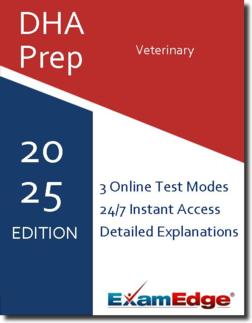DHA Veterinary (DHA-VET) Practice Exams & Test Prep - Topics
Based on 32 Reviews
- Real Exam Simulation: Timed questions and matching content build comfort for your DHA Veterinary test day.
- Instant, 24/7 Access: Web-based DHA Veterinary practice exams with no software needed.
- Clear Explanations: Step-by-step answers and explanations for your DHA exam to strengthen understanding.
- Boosted Confidence: Reduces anxiety and improves test-taking skills to ace your DHA Veterinary (DHA-VET).

Understanding the exact breakdown of the DHA Veterinary test will help you know what to expect and how to most effectively prepare. The DHA Veterinary has multiple-choice questions The exam will be broken down into the sections below:
| DHA Veterinary Exam Blueprint | ||
|---|---|---|
| Domain Name | % | Number of Questions |
| Pharmacy & Pharmacology | 12% | 12 |
| Surgical Nursing | 11% | 11 |
| Dentistry | 7% | 7 |
| Laboratory Procedures | 12% | 12 |
| Animal Care and Nursing | 22% | 22 |
| Diagnostic Imaging | 7% | 7 |
| Anesthesia | 16% | 16 |
| Emergency Medicine/Critical Care | 6% | 6 |
| Pain Management/Analgesia | 7% | 7 |


